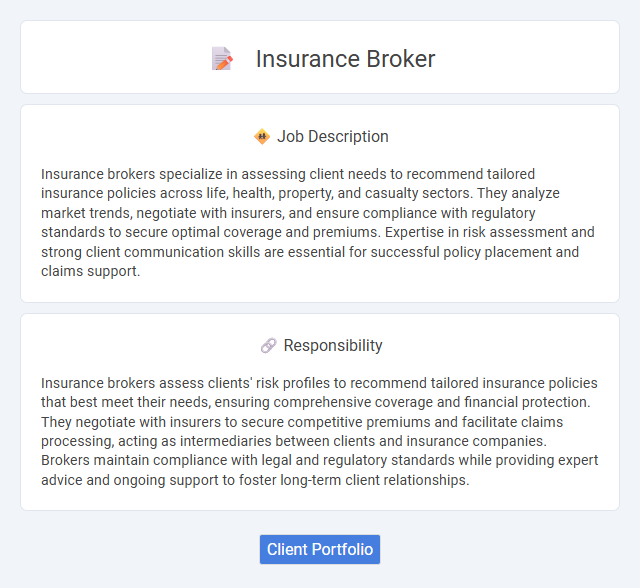
Insurance brokers specialize in assessing client needs to recommend tailored insurance policies across life, health, property, and casualty sectors. They analyze market trends, negotiate with insurers, and ensure compliance with regulatory standards to secure optimal coverage and premiums. Expertise in risk assessment and strong client communication skills are essential for successful policy placement and claims support.
Individuals who are detail-oriented and possess strong communication skills are likely to excel as insurance brokers. Those comfortable with analyzing complex information and negotiating policies may find this career suitable. People who thrive in a fast-paced environment and enjoy building client relationships probably have a higher chance of success in this role.
Qualification
Insurance brokers require strong analytical skills and a deep understanding of insurance policies to assess client needs effectively. Professional qualifications such as the Chartered Insurance Broker (CIB) certification or licenses from regulatory bodies like the National Association of Insurance Commissioners (NAIC) are essential for credibility. Experience in risk management and excellent communication abilities enhance their capacity to negotiate competitive coverage options for clients.
Responsibility
Insurance brokers assess clients' risk profiles to recommend tailored insurance policies that best meet their needs, ensuring comprehensive coverage and financial protection. They negotiate with insurers to secure competitive premiums and facilitate claims processing, acting as intermediaries between clients and insurance companies. Brokers maintain compliance with legal and regulatory standards while providing expert advice and ongoing support to foster long-term client relationships.
Benefit
Insurance brokers likely provide clients with personalized advice, increasing the probability of finding the most suitable coverage for their needs. Their expertise in negotiating with insurers may lead to better policy terms and competitive premium rates. Clients can expect enhanced risk management and time savings by relying on brokers to navigate complex insurance options efficiently.
Challenge
The job of an insurance broker often involves navigating complex client needs and regulatory requirements, which may present significant challenges. There is a probability that brokers must continuously update their knowledge to effectively match clients with appropriate policies in a competitive market. Meeting sales targets while maintaining ethical standards can also pose ongoing difficulties in this profession.
Career Advancement
An insurance broker's career advancement is often driven by gaining industry certifications such as CPCU (Chartered Property Casualty Underwriter) and expanding expertise in niche markets like life, health, or commercial insurance. Developing strong client relationships and mastering risk assessment techniques increases opportunities for higher commissions and leadership roles within brokerage firms. Continuous professional development and staying updated with regulatory changes enhance an insurance broker's potential to advance into senior advisory or management positions.
Key Terms
Client Portfolio
An insurance broker manages a diverse client portfolio by evaluating individual and business risks to recommend tailored insurance policies that maximize coverage while minimizing costs. They maintain strong relationships through regular policy reviews, claims assistance, and updates on market trends to ensure client needs are continuously met. Expertise in various insurance products, including life, health, property, and commercial insurance, enables brokers to optimize client portfolios for comprehensive risk management.
 kuljobs.com
kuljobs.com